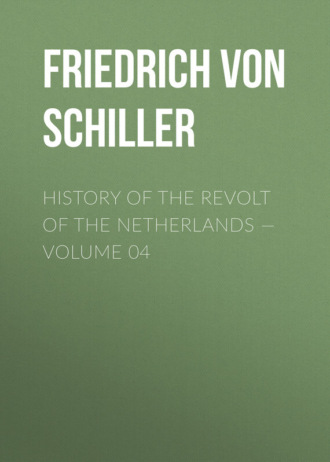
Фридрих Шиллер
History of the Revolt of the Netherlands — Volume 04
Two days and two nights Antwerp had continued in this alarming state. During the tumult the Roman Catholics had succeeded in placing barrels of gunpowder under the Meer Bridge, and threatened to blow into the air the whole army of the Calvinists, who had done the same in other places to destroy their adversaries. The destruction of the town hung on the issue of a moment, and nothing but the prince's presence of mind saved it.
Noircarmes, with his army of Walloons, still lay before Valenciennes, which, in firm reliance on being relieved by the Gueux, obstinately refused to listen to all the representations of the regent, and rejected every idea of surrender. An order of the court had expressly forbidden the royalist general to press the siege until he should receive reinforcements from Germany. Whether from forbearance or fear, the king regarded with abhorrence the violent measure of storming the place, as necessarily involving the innocent in the fate of the guilty, and exposing the loyal subject to the same ill-treatment as the rebel. As, however, the confidence of the besieged augmented daily, and emboldened by the inactivity of the besiegers, they annoyed him by frequent sallies, and after burning the cloisters before the town, retired with the plunder — as the time uselessly lost before this town was put to good use by the rebels and their allies, Noircarmes besouht the duchess to obtain immediate permission from the king to take it by storm. The answer arrived more quickly than Philip was ever before wont to reply. As yet they must be content, simply to make the necessary preparations, and then to wait awhile to allow terror to have its effect; but if upon this they did not appear ready to capitulate, the storming might take place, but, at the same time, with the greatest possible regard for the lives of the inhabitants. Before the regent allowed Noircarmes to proceed to this extremity she empowered Count Egmont, with the Duke Arschot, to treat once more with the rebels amicably. Both conferred with the deputies of the town, and omitted no argument calculated to dispel their delusion. They acquainted them with the defeat of Thoulouse, their sole support, and with the fact that the Count of Megen had cut off the army of the Gueux from the town, and assured them that if they had held out so long they owed it entirely to the king's forbearance. They offered them full pardon for the past; every one was to be free to prove his innocence before whatever tribunal he should chose; such as did not wish to avail themselves of this privilege were to be allowed fourteen days to quit the town with all their effects. Nothing was required of the townspeople but the admission of the garrison. To give time to deliberate on these terms an armistice of three days was granted. When the deputies returned they found their fellow-citizens less disposed than ever to an accommodation, reports of new levies by the Gueux having, in the meantime, gained currency. Thoulouse, it was pretended, had conquered, and was advancing with a powerful army to relieve the place. Their confidence went so far that they even ventured to break the armistice, and to fire upon the besiegers. At last the burgomaster, with difficulty, succeeded in bringing matters so far towards a peaceful settlement that twelve of the town counsellors were sent into the camp with the following conditions: The edict by which Valenciennes had been charged with treason and declared an enemy to the country was required to be recalled, the confiscation of their goods revoked, and the prisoners on both sides restored to liberty; the garrison was not to enter the town before every one who thought good to do so had placed himself and his property in security; and a pledge to be given that the inhabitants should not be molested in any manner, and that their expenses should be paid by the king.
Noircarmes was so indignant with these conditions that he was almost on the point of ill-treating the deputies. If they had not come, he told them, to give up the place, they might return forthwith, lest he should send them home with their hands tied behind their backs. Upon this the deputies threw the blame on the obstinacy of the Calvinists, and entreated him, with tears in their eyes, to keep them in the camp, as they did not, they said, wish to have anything more to do with their rebellious townsmen, or to be joined in their fate. They even knelt to beseech the intercession of Egmont, but Noircarmes remained deaf to all their entreaties, and the sight of the chains which he ordered to be brought out drove them reluctantly enough back to Valenciennes. Necessity, not severity, imposed this harsh procedure upon the general. The detention of ambassadors had on a former occasion drawn upon him the reprimand of the duchess; the people in the town would not have failed to have ascribed the non-appearance of their present deputies to the same cause as in the former case had detained them. Besides, he was loath to deprive the town of any out of the small residue of well- disposed citizens, or to leave it a prey to a blind, foolhardy mob. Egmont was so mortified at the bad report of his embassy that he the night following rode round to reconnoitre its fortifications, and returned well satisfied to have convinced himself that it was no longer tenable.
Valenciennes stretches down a gentle acclivity into the level plain, being built on a site as strong as it is delightful. On one side enclosed by the Scheldt and another smaller river, and on the other protected by deep ditches, thick walls, and towers, it appears capable of defying every attack. But Noircarmes had discovered a few points where neglect had allowed the fosse to be filled almost up to the level of the natural surface, and of these he determined to avail himself in storming. He drew together all the scattered corps by which he had invested the town, and during a tempestuous night carried the suburb of Berg without the loss of a single man. He then assigned separate points of attack to the Count of Bossu, the young Charles of Mansfeld, and the younger Barlaimont, and under a terrible fire, which drove the enemy from his walls, his troops were moved up with all possible speed. Close before the town, and opposite the gate under the eyes of the besiegers, and with very little loss, a battery was thrown up to an equal height with the fortifications. From this point the town was bombarded with an unceasing fire for four hours. The Nicolaus tower, on which the besieged had planted some artillery, was among the first that fell, and many perished under its ruins. The guns were directed against all the most conspicuous buildings, and a terrible slaughter was made amongst the inhabitants. In a few hours their principal works were destroyed, and in the gate itself so extensive a breach was made that the besieged, despairing of any longer defending themselves, sent in haste two trumpeters to entreat a parley. This was granted, but the storm was continued without intermission. The ambassador entreated Noircarmes to grant them the same terms which only two days before they had rejected. But circumstances had now changed, and the victor would hear no more of conditions. The unceasing fire left the inhabitants no time to repair the ramparts, which filled the fosse with their debris, and opened many a breach for the enemy to enter by. Certain of utter destruction, they surrendered next morning at discretion after a bombardment of six-and- thirty hours without intermission, and three thousand bombs had been thrown into the city. Noircarmes marched into the town with his victorious army under the strictest discipline, and was received by a crowd of women and children, who went to meet him, carrying green boughs, and beseeching his pity. All the citizens were immediately disarmed, the commandant and his son beheaded; thirty-six of the most guilty of the rebels, among whom were La Grange and another Calvinistic preacher, Guido de Bresse, atoned for their obstinacy at the gallows; all the municipal functionaries were deprived of their offices, and the town of all its privileges. The Roman Catholic worship was immediately restored in full dignity, and the Protestant abolished. The Bishop of Arras was obliged to quit his residence in the town, and a strong garrison placed in it to insure its future obedience.
The fate of Valenciennes, towards which all eyes had been turned, was a warning to the other towns which had similarly offended. Noircarmes followed up his victory, and marched immediately against Maestricht, which surrendered without a blow, and received a garrison. From thence he marched to Tornhut to awe by his presence the people of Herzogenbusch and Antwerp. The Gueux in this place, who under the command of Bomberg had carried all things before them, were now so terrified at his approach that they quitted the town in haste. Noircarmes was received without opposition. The ambassadors of the duchess were immediately set at liberty. A strong garrison was thrown into Tornhut. Cambray also opened its gates, and joyfully recalled its archbishop, whom the Calvinists had driven from his see, and who deserved this triumph as he did not stain his entrance with blood. Ghent, Ypres, and Oudenarde submitted and received garrisons. Gueldres was now almost entirely cleared of the rebels and reduced to obedience by the Count of Megen. In Friesland and Groningen the Count of Aremberg had eventually the same success; but it was not obtained here so rapidly or so easily, since the count wanted consistency and firmness, and these warlike republicans maintained more pertinaciously their privileges, and were greatly supported by the strength of their position. With the exception of Holland all the provinces had yielded before the victorious arms of the duchess. The courage of the disaffected sunk entirely, and nothing was left to them but flight or submission.
RESIGNATION OF WILLIAM OF ORANGE
Ever since the establishment of the Guesen league, but more perceptibly since the outbreak of the Iconoclasts, the spirit of rebellion and disaffection had spread so rapidly among all classes, parties had become so blended and confused, that the regent had difficulty in distinguishing her own adherents, and at last hardly knew on whom to rely. The lines of demarcation between the loyal and the disaffected had grown gradually fainter, until at last they almost entirely vanished. The frequent alterations, too, which she had been obliged to make in the laws, and which were at most the expedients and suggestions of the moment, had taken from them their precision and binding force, and had given full scope to the arbitrary will of every individual whose office it was to interpret them. And at last, amidst the number and variety of the interpretations, the spirit was lost and the intention of the lawgiver baffled. The close connection which in many cases subsisted between Protestants and Roman Catholics, between Gueux and Royalists, and which not unfrequently gave them a common interest, led the latter to avail themselves of the loophole which the vagueness of the laws left open, and in favor of their Protestant friends and associates evaded by subtle distinctions all severity in the discharge of their duties. In their minds it was enough not to be a declared rebel, not one of the Gueux, or at least not a heretic, to be authorized to mould their duties to their inclinations, and to set the most arbitrary limits to their obedience to the king. Feeling themselves irresponsible, the governors of the provinces, the civil functionaries, both high and low, the municipal officers, and the military commanders had all become extremely remiss in their duty, and presuming upon this impunity showed a pernicious indulgence to the rebels and their adherents which rendered abortive all the regent's measures of coercion. This general indifference and corruption of so many servants of the state had further this injurious result, that it led the turbulent to reckon on far stronger support than in reality they had cause for, and to count on their own side all who were but lukewarm adherents of the court. This way of thinking, erroneous as it was, gave them greater courage and confidence; it had the same effect as if it had been well founded; and the uncertain vassals of the king became in consequence almost as injurious to him as his declared enemies, without at the same time being liable to the same measures of severity. This was especially the case with the Prince of Orange, Counts Egmont, Bergen, Hogstraten, Horn, and several others of the higher nobility. The regent felt the necessity of bringing these doubtful subjects to an explanation, in order either to deprive the rebels of a fancied support or to unmask the enemies of the king. And the latter reason was of the more urgent moment when being obliged to send an army into the field it was of the utmost importance to entrust the command of the troops to none but those of whose fidelity she was fully assured. She caused, therefore, an oath to be drawn up which bound all who took it to advance the Roman Catholic faith, to pursue and punish the Iconoclasts, and to help by every means in their power in extirpating all kinds of heresy. It also pledged them to treat the king's enemies as their own, and to serve without distinction against all whom the regent in the king's name should point out. By this oath she did not hope so much to test their sincerity, and still less to secure them, as rather to gain a pretext for removing the suspected parties if they declined to take it, and for wresting from their hands a power which they abused, or a legitimate ground for punishing them if they took it and broke it. This oath was exacted from all Knights of the Fleece, all civil functionaries and magistrates, all officers of the army — from every one in short who held any appointment in the state. Count Mansfeld was the first who publicly took it in the council of state at Brussels; his example was followed by the Duke of Arschot, Counts Egmont, Megen, and Barlaimont. Hogstraten and Horn endeavored to evade the necessity. The former was offended at a proof of distrust which shortly before the regent had given him. Under the pretext that Malines could not safely be left any longer without its governor, but that the presence of the count was no less necessary in Antwerp, she had taken from him that province and given it to another whose fidelity she could better reckon upon. Hostraten expressed his thanks that she had been pleased to release him from one of his burdens, adding that she would complete the obligation if she would relieve him from the other also. True to his determination Count Horn was living on one of his estates in the strong town of Weerdt, having retired altogether from public affairs. Having quitted the service of the state, he owed, he thought, nothing more either to the republic or to the king, and declined the oath, which in his case appears at last to have been waived.
The Count of Brederode was left the choice of either taking the prescribed oath or resigning the command of his squadron of cavalry. After many fruitless attempts to evade the alternative, on the plea that he did not hold office in the state, he at last resolved upon the latter course, and thereby escaped all risk of perjuring himself.
Vain were all the attempts to prevail on the Prince of Orange to take the oath, who, from the suspicion which had long attached to him, required more than any other this purification; and from whom the great power which it had been necessary to place in his hands fully justified the regent in exacting it. It was not, however, advisable to proceed against him with the laconic brevity adopted towards Brederode and the like; on the other hand, the voluntary resignation of all his offices, which he tendered, did not meet the object of the regent, who foresaw clearly enough how really dangerous he would become, as soon as he should feel himself independent, and be no longer checked by any external considerations of character or duty in the prosecution of his secret designs. But ever since the consultation in Dendermonde the Prince of Orange had made up his mind to quit the service of the King of Spain on the first favorable opportunity, and till better days to leave the country itself. A very disheartening experience had taught him how uncertain are hopes built on the multitude, and how quickly their zeal is cooled by the necessity of fulfilling its lofty promises. An army was already in the field, and a far stronger one was, he knew, on its road, under the command of the Duke of Alva. The time for remonstrauces was past; it was only at the head of an army that an advantageous treaty could now be concluded with the regent, and by preventing the entrance of the Spanish general. But now where was he to raise this army, in want as he was of money, the sinews of warfare, since the Protestants had retracted their boastful promises and deserted him in this pressing emergency?
[How valiant the wish, and how sorry the deed was, is proved by the following instance amongst others. Some friends of the national liberty, Roman Catholics as well as Protestants, had solemnly engaged in Amsterdam to subscribe to a common fund the hundredth penny of their estates, until a sum of eleven thousand florins should be collected, which was to be devoted to the common cause and interests. An alms-box, protected by three locks, was prepared for the reception of these contributions. After the expiration of the prescribed period it was opened, and a sum was found amounting to seven hundred florins, which was given to the hostess of the Count of Brederode, in part payment of his unliquidated score. Univ. Hist. of the N., vol. 3.]
Religious jealousy and hatred, moreover, separated the two Protestant churches, and stood in the way of every salutary combination against the common enemy of their faith. The rejection of the Confession of Augsburg by the Calvinists had exasperated all the Protestant princes of Germany, so that no support was to be looked for from the empire. With Count Egmont the excellent army of Walloons was also lost to the cause, for they followed with blind devotion the fortunes of their general, who had taught them at St. Quentin and Gravelines to be invincible. And again, the outrages which the Iconoclasts had perpetrated on the churches and convents had estranged from the league the numerous, wealthy, and powerful class of the established clergy, who, before this unlucky episode, were already more than half gained over to it; while, by her intrigues, the regent daily contrived to deprive the league itself of some one or other of its most influential members.
All these considerations combined induced the prince to postpone to a more favorable season a project for which the present juncture was little suited, and to leave a country where his longer stay could not effect any advantage for it, but must bring certain destruction on himself. After intelligence gleaned from so many quarters, after so many proofs of distrust, so many warnings from Madrid, he could be no longer doubtful of the sentiments of Philip towards him. If even he had any doubt, his uncertainty would soon have been dispelled by the formidable armament which was preparing in Spain, and which was to have for its leader, not the king, as was falsely given out, but, as he was better informed, the Duke of Alva, his personal enemy, and the very man he had most cause to fear. The prince had seen too deeply into Philip's heart to believe in the sincerity of his reconciliation after having once awakened his fears. He judged his own conduct too justly to reckon, like his friend Egmont, on reaping a gratitude from the king to which he had not sown. He could therefore expect nothing but hostility from him, and prudence counselled him to screen himself by a timely flight from its actual outbreak. He had hitherto obstinately refused to take the new oath, and all the written exhortations of the regent had been fruitless. At last she sent to him at Antwerp her private secretary, Berti, who was to put the matter emphatically to his conscience, and forcibly remind him of all the evil consequences which so sudden a retirement from the royal service would draw upon the country, as well as the irreparable injury it would do to his own fair fame. Already, she informed him by her ambassador, his declining the required oath had cast a shade upon his honor, and imparted to the general voice, which accused him of an understanding with the rebels, an appearance of truth which this unconditional resignation would convert to absolute certainty. It was for the sovereign to discharge his servants, but it did not become the servant to abandon his sovereign. The envoy of the regent found the prince in his palace at Antwerp, already, as it appeared, withdrawn from the public service, and entirely devoted to his private concerns. The prince told him, in the presence of Hogstraten, that he had refused to take the required oath because he could not find that such a proposition had ever before been made to a governor of a province; because he had already bound himself, once for all, to the king, and therefore, by taking this new oath, he would tacitly acknowledge that he had broken the first. He had also refused because the old oath enjoined him to protect the rights and privileges of the country, but he could not tell whether this new one might not impose upon him duties which would contravene the first; because, too, the clause which bound him to serve, if required, against all without distinction, did not except even the emperor, his feudal lord, against whom, however, he, as his vassal, could not conscientiously make war. He had refused to take this oath because it might impose upon him the necessity of surrendering his friends and relations, his children, nay, even his wife, who was a Lutheran, to butchery. According to it, moreover, he must lend himself to every thing which it should occur to the king's fancy or passion to demand. But the king might thus exact from him things which he shuddered even to think of, and even the severities which were now, and had been all along, exercised upon the Protestants, were the most revolting to his heart. This oath, in short, was repugnant to his feelings as a man, and he could not take it. In conclusion, the name of the Duke of Alva dropped from his lips in a tone of bitterness, and he became immediately silent.
All these objections were answered, point by point, by Berti. Certainly such an oath had never been required from a governor before him, because the provinces had never been similarly circumstanced. It was not exacted because the governors had broken the first, but in order to remind them vividly of their former vows, and to freshen their activity in the present emergency. This oath would not impose upon him anything which offended against the rights and privileges of the country, for the king had sworn to observe these as well as the Prince of Orange. The oath did not, it was true, contain any reference to a war with the emperor, or any other sovereign to whom the prince might be related; and if he really had scruples on this point, a distinct clause could easily be inserted, expressly providing against such a contingency. Care would be taken to spare him any duties which were repugnant to his feelings as a man, and no power on earth would compel him to act against his wife or against his children. Berti was then passing to the last point, which related to the Duke of Alva, but the prince, who did not wish to have this part of his discourse canvassed, interrupted him. "The king was coming to the Netherlands," he said, "and he knew the king. The king would not endure that one of his servants should have wedded a Lutheran, and he had therefore resolved to go with his whole family into voluntary banishment before he was obliged to submit to the same by compulsion. But," he concluded, "wherever he might be, he would always conduct himself as a subject of the king." Thus far-fetched were the motives which the prince adduced to avoid touching upon the single one which really decided him.
Berti had still a hope of obtaining, through Egmont's eloquence, what by his own he despaired of effecting. He therefore proposed a meeting with the latter (1567), which the prince assented to the more willingly as he himself felt a desire to embrace his friend once more before his departure, and if possible to snatch the deluded man from certain destruction. This remarkable meeting, at which the private secretary, Berti, and the young Count Mansfeld, were also present, was the last that the two friends ever held, and took place in Villebroeck, a village on the Rupel, between Brussels and Antwerp. The Calvinists, whose last hope rested on the issue of this conference, found means to acquaint themselves of its import by a spy, who concealed himself in the chimney of the apartment where it was held. All three attempted to shake the determination of the prince, but their united eloquence was unable to move him from his purpose. "It will cost you your estates, Orange, if you persist in this intention," said the Prince of Gaure, as he took him aside to a window. "And you your life, Egmont, if you change not yours," replied the former. "To me it will at least be a consolation in my misfortunes that I desired, in deed as well as in word, to help my country and my friends in the hour of need; but you, my friend, you are dragging friends and country with you to destruction." And saying these words, he once again exhorted him, still more urgently than ever, to return to the cause of his country, which his arm alone was yet able to preserve; if not, at least for his own sake to avoid the tempest which was gathering against him from Spain.
But all the arguments, however lucid, with which a far-discerning prudence supplied him, and however urgently enforced, with all the ardor and animation which the tender anxiety of friendship could alone inspire, did not avail to destroy the fatal confidence which still fettered Egmont's better reason. The warning of Orange seemed to come from a sad and dispirited heart; but for Egmont the world still smiled. To abandon the pomp and affluence in which he had grown up to youth and manhood; to part with all the thousand conveniences of life which alone made it valuable to him, and all this to escape an evil which his buoyant spirit regarded as remote, if not imaginary; no, that was not a sacrifice which could be asked from Egmont. But had he even been less given to indulgence than he was, with what heart could he have consigned a princess, accustomed by uninterrupted prosperity to ease and comfort, a wife who loved him as dearly as she was beloved, the children on whom his soul hung in hope and fondness, to privations at the prospect of which his own courage sank, and which a sublime philosophy alone can enable sensuality to undergo. "You will never persuade me, Orange," said Egmont, "to see things in the gloomy light in which they appear to thy mournful prudence. When I have succeeded in abolishing the public preachings, and chastising the Iconoclasts, in crushing the rebels, and restoring peace and order in the provinces, what can the king lay to my charge? The king is good and just; I have claims upon his gratitude, and I must not forget what I owe to myself." "Well, then," cried Orange, indignantly and with bitter anguish, "trust, if you will, to this royal gratitude; but a mournful presentiment tells me — and may Heaven grant that I am deceived! — that you, Egmont, will be the bridge by which the Spaniards will pass into our country to destroy it." After these words, he drew him to his bosom, ardently clasping him in his arms. Long, as though the sight was to serve for the remainder of his life, did he keep his eyes fixed upon him; the tears fell; they saw each other no more.
The very next day the Prince of Orange wrote his letter of resignation to the regent, in which he assured her of his perpetual esteem, and once again entreated her to put the best interpretation on his present step. He then set off with his three brothers and his whole family for his own town of Breda, where he remained only as long as was requisite to arrange some private affairs. His eldest son, Prince Philip William, was left behind at the University of Louvain, where he thought him sufficiently secure under the protection of the privileges of Brabant and the immunities of the academy; an imprudence which, if it was really not designed, can hardly be reconciled with the just estimate which, in so many other cases, he had taken of the character of his adversary. In Breda the heads of the Calvinists once more consulted him whether there was still hope for them, or whether all was irretrievably lost. "He had before advised them," replied the prince, "and must now do so again, to accede to the Confession of Augsburg; then they might rely upon aid from Germany. If they would still not consent to this, they must raise six hundred thousand florins, or more, if they could." "The first," they answered, "was at variance with their conviction and their conscience; but means might perhaps be found to raise the money if he would only let them know for what purpose he would use it." "No!" cried he, with the utmost displeasure, "if I must tell you that, it is all over with the use of it." With these words he immediately broke off the conference and dismissed the deputies.
The Prince of Orange was reproached with having squandered his fortune, and with favoring the innovations on account of his debts; but he asserted that he still enjoyed sixty thousand florins yearly rental. Before his departure he borrowed twenty thousand florins from the states of Holland on the mortgage of some manors. Men could hardly persuade themselves that he would have succumbed to necessity so entirely, and without an effort at resistance given up all his hopes and schemes. But what he secretly meditated no one knew, no one had read in his heart. Being asked how he intended to conduct himself towards the King of Spain, "Quietly," was his answer, "unless he touches my honor or my estates." He left the Netherlands soon afterwards, and betook himself in retirement to the town of Dillenburg, in Nassau, at which place he was born. He was accompanied to Germany by many hundreds, either as his servants or as volunteers, and was soon followed by Counts Hogstraten, Kuilemberg, and Bergen, who preferred to share a voluntary exile with him rather than recklessly involve themselves in an uncertain destiny. In his departure the nation saw the flight of its guardian angel; many had adored, all had honored him. With him the last stay of the Protestants gave way; they, however, had greater hopes from this man in exile than from all the others together who remained behind. Even the Roman Catholics could not witness his departure without regret. Them also had he shielded from tyranny; he had not unfrequently protected them against the oppression of their own church, and he had rescued many of them from the sanguinary jealousy of their religious opponents. A few fanatics among the Calvinists, who were offended with his proposal of an alliance with their brethren, who avowed the Confession of Augsburg, solemnized with secret thanksgivings the day on which the enemy left them. (1567).







